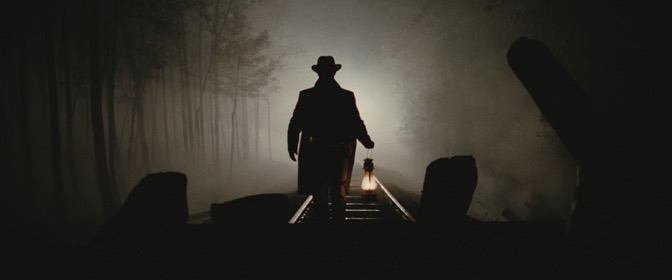Anatomy of a Scene - The Assassination of Jesse James by the Coward Robert Ford

When a movie tells you how it is going to end, you know as a member of the audience that the ending matters less than the journey to get there. And over the years it has become almost a trope, where a movie opens with the main character in a very bad situation, before flashing back to find out how they got there, then promptly letting them escape. But then there are movies like this one, where they don’t engage in the trope. Jesse James dies in this movie. We know it from the second we look at the cover or walk into the theater. He is going to die, and we are going to have to watch.
We talk about the moment of a character's death a lot here because it can define so much about them. The Assassination of Jesse James by the Coward Robert Ford is about the death of one man, but it takes a hell of a long time to get there. It is a movie about inevitability, acceptance, and the life and death of one man.
Watching a man accept and welcome his death is a strange thing. Jesse James is a force of nature. Charismatic, violent, a whirlwind that draws people in, chews them up, and spits them back into the world, broken and bloodied. He approaches the end of his life pursued by federal agents and friends alike. So on this day, in this home, he tries to find some measure of peace.
We see him standing in the kitchen of the small, slightly run down home when Ford first walks in. James strikes an imposing figure, standing in the kitchen with two pistols strapped around his waist, chatting amicably with his wife. He is confident and graceful where Ford is not. The young man walks in, catching sight of a newspaper lying on the couch that reveals his deception. He helped the authorities catch another member of the gang, and the story is on the front page. He tries to hid it, stashing the cover under a pillow on the couch as he watches to make sure James doesn’t turn around.
Remarkably little is said in this more than six minute long scene, as the camera slowly shifts from James to Robert to Charles, Robert’s brother. There isn’t a lot of fancy filmmaking techniques going on here, and it enhances the moment. It is a character study of two men and how their fates have intertwined. It focuses on Ford and James in turn, and we wait for what will happen next. We all know how this encounter end. We know Ford will kill him. It’s in the title of the movie, that Jesse James is killed by Robert Ford, but if you are unfamiliar with history, then you don’t know what happens in this small house.
The film does a masterful job at building up James in preparation for this moment, with two hours of his violent unpredictability preparing you for anything. The long hold on his back when Ford walks in primes us. His guns are strapped around his waist, so when Ford buckles on his belt, it comes with a sense of determination and finality. This is ending here and now. He tries to hide the paper from James, but he will find it, and he must prepare for what comes next. We expect a gunfight, a bloodbath in the center of this family's home, and we wait for the violence to erupt as James retrieves the paper from the living room and sits down.
As the three men sit around the table, James slowly reads the article, tracing his finger over the page, almost as if to let us read along with him. Ford sits trembling next to him, woefully unprepared for the confrontation to come. “Very strange. It says here that Did surrendered three weeks ago. You must have been right in the neighborhood.”
“Apparently they kept it a secret.” He tries to play off the accusation, to deflect, but he can’t. He is young. Foolish. And trying to kill the man that he idolizes. He swallows and stutters and stammers, stumbling over his words like he is lost in the dark. James wants so badly to believe him, to allay his suspicions, but he can’t. You watch his face as reality washes over him and he resigns himself to his coming death.
One of the most brilliant things about this scene is the simplicity of the camera work. It focuses on one man at a time, and holds it for an agonizingly long time. It isn’t a scene of conflict, far from it in fact. It is three men wrestling with themselves over what happens next. And we have to watch that struggle. Ford retreats from the kitchen and sits in the living room, cradling his head in one hand as he slowly rocks back and forth. His brother joins him, buckling his own gun around his waist as he crosses the frame and sits down.
They leave James behind for his long walk to the place of his death. The other two men are cautious around him, as they wait for him to fight back, to draw his guns and go out in a blaze of glory. But he doesn’t. He slowly enters the scene, framed by the door around him.
“Are you two ready?”
It is ostensibly about the robbery that they are planning, but everyone knows otherwise. It has become a theater of death, a way for James to face forward and walk unflinching to his end. But more importantly, it is about being kind to Robert Ford, the shy, quivering 20 year-old boy who sits in front of him.
Ford doesn’t reply to him, and as James walks across the room, the boy nods slightly. They stare at each other as he walks, an executioner looking at his victim, Robert staring into his eyes one last time, one hand quivering, on the verge of breaking out into tears.
James watches his daughter from the window as she sits outside and plays on the ground. An empty boot lies in the grass. We stare at his back as he thinks. His face distorts through the pane of glass.
“Guess I’ll take my guns off. For fear the neighbors might spot ‘em”
It is a slow and methodical process, almost ritualistic as he pulls the leather belt from his waist, laying it flat on the couch almost reverently. It is a practiced ritual, one that he’s undoubtedly performed every night before this one. But this is different. This moment is the death of Jesse James as an outlaw, willingly accepting his death at the hands of his subordinates. He doesn’t say goodbye to his wife or daughter. He says goodbye to the life of violence that he lived.
“Don’t that picture look dusty.”
He slowly strides over as a mournful piano kicks in, muffling the sounds around him. Ford stands up, and his brother draws his revolver first, pointing it at James’ back. Robert takes a breath and draws his own quickly, and we see from his point of view as he points his gun at the back of James’ head. In the reflection of the glass of the picture frame, James watches as Robert cocks his gun.
He fires once.
A spurt of blood kicks from the back of James’ head as it slams forward and cracks the glass picture frame. The camera changes, giving us a pinhole view of the scene as the man crashes to the floor dead. We are explicitly the audience in this moment, and the way this shot mimics old photographs only serves to reinforce it. It is sudden and violent, and James is dead.
In his final moments, he was kind. He climbed up on that chair to clean that picture, but it was as if he was climbing it to tie a rope across the rafters to hang himself. The outcome was the same. A sort of noble suicide, and it brings imagery of The Shawshank Redemption to mind as he mounts the chair. He spares Ford from having to look him in the eyes when he died, saving the young man from that final cruelty, whether or not he deserved that mercy.
Ford is not the coward here, we are. We stare at James’ back, eagerly waiting for him to die all throughout the scene. We are the crowds that beg Rob Ford to reenact this killing for ten years. This scene is just another in a long line of grisly theater, killing an evil man over and over so that we can feel just. Ford is just the person who has to kill the man who he has idolized for years.
10 years later, Robert Ford is shot in a bar. His killer is later pardoned by the State Governor. He and his brother were each promised $10,000 as bounty for the killing of Jesse James. They never got more than $500 a piece.
_____________________________________________

Tom has been writing about media since he was a senior in high school. He likes long walks on the beach, dark liquor, and when characters reload guns in action movies.
You Might Also Like:
Anatomy of a Scene - FoxcatcherAnatomy of a Scene - Sicario
Anatomy of a Scene - No Country for Old Men
_____________________________________________